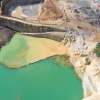Source: EurActiv.com
14 September 2011 - The European Union should establish specific decision-making mechanisms to deal with raw materials issues and coordinate action between member states, the European Parliament said yesterday (13 September).
The Parliament adopted on Tuesday a non-binding resolution on the EU's raw materials strategy, presented by the European Commission earlier in February.
The report, drafted by Green German MEP Reinhard Bütikofer, calls for greater EU coordination on raw materials policy, particularly on the external dimension.
"We need to find out how to organise cooperation between member states and the Commission because effective governance is absolute key to the success of an effective raw materials strategy," Bütikofer said.
The report lists a number of instruments to achieve this. It calls for an EU high-level interdepartmental raw materials task force along the lines of French and US examples. The task force would bring together the relevant Commission departments, the Joint Research Centre (JRC), the European Environment Agency and the European External Action Service (EEAS) to draw up, monitor and review policies, including partnership agreements, to ensure strategic coherence.
The task force would also promote the establishment of an early-warning system – a 'risk-radar' – for market distortion and resource-fuelled conflicts.
The Commission's original proposal does not suggest any EU-level governance structures on raw materials.
Speaking to the press ahead of the vote, MEP Bütikofer said that while some member states had been developing their own policies, "national strategies shouldn't be conflicting" with those of the EU. While national strategies represent a "valuable contribution" to the debate, they could also be "a distraction", he argued.
Germany unveiled its national raw-materials strategy in 2010, Finland also finalised its minerals strategy last year and France presented its action plan for strategic materials early this year.
Innovation
The Parliament's report also highlights the need for an ambitious EU policy on recycling of critical raw materials. The House particularly stressed the importance of recycling rare earths, something that the Commission did not suggest in its original proposal.
The report also urges the establishment of a European Innovation Partnership (EIP) on raw materials – a Commission idea to boost resource efficiency on the field. However, for the time being, Germany has blocked negotiations on the topic in the Council for "no objective reason", Bütikofer said.
With the raw materials innovation partnership likely to be delayed further, the Parliament report calls on the Commission "to make full use of the existing REE [rare earth elements] competency within the EU".
Bütikofer suggested establishing an "EU rare earth competency network," which could later be merged into the innovation partnership once it has been established.
For the complete article, please see EurActiv.com.









